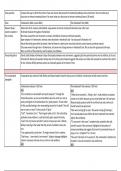Other
The relationships between men and women essay plan
- Module
- Unit 2 - Prose
- Institution
- PEARSON (PEARSON)
Essay plan on the relationships between men and women in The Handmaid's Tale and Frankenstein. Has a line of argument, topic paragraphs, quotes with analysis, context and comparisons between texts.
[Show more]



